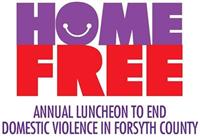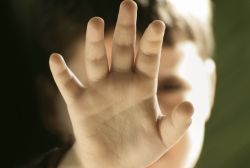By Paige Berntson, Staff Attorney with Children’s Law Center of Central North Carolina
“We try not to fight around our children.”
“My kids can talk to me if they are upset.”
“They are in bed and don’t hear anything.”
“I would never hurt my child.”
As a Guardian ad Litem at the Children’s Law Center of Central North Carolina, these are statements I hear from parents on a regular basis. I think we all do our best to protect and care for our children; we love them and intend to keep them safe from harm. When parents find themselves in an abusive situation and every day is a struggle, they may be unable to see the full impact domestic violence has on themselves and their children.
You’ve probably heard about domestic violence on the news lately. But domestic violence doesn’t just occur on the news or to “someone else.” Domestic violence is happening in our community. It is affecting families of all economic backgrounds and all races. You likely know someone that has been impacted. A staggering one in every four women will experience domestic violence in her lifetime. This can include physical, sexual, or psychological abuse or control. And chances are the children are being affected, too. One study shows that over 3 million children between the ages of 3-17 are exposed to domestic violence each year. Unfortunately, as much as we try to keep children away from the violence, they see, hear, and feel much more than we realize.
At the Children’s Law Center, we advocate for children who are experiencing domestic violence in their home. Our role is to make recommendations to the court regarding the best interest of the children, so that the judge can have more information before making a decision about where the child should live, who they should visit, or what services may be helpful for the family. I have the privilege of getting to know the family members and especially the children. These innocent voices tell it like it really is, sometimes to the surprise of the many adults who know them well.
Jonathon, age 10, told me that he can’t sleep at night because he lies in bed listening to his parents fight. He stays awake worrying that his dad is going to hurt his mom. Or there’s 14-year-old Sandra, who doesn’t want to say anything bad about her mother’s abusive boyfriend. Sandra knows that he helps to pay their bills, and without him they could lose their home. Another teen, David, said that he watched his dad choke his mom until she passed out. He was terrified, yet pretended he was looking for something in her room in order to check on her. Even the youngest children can understand what is going on in the home. Five-year-old Chrissy told me that she used to sit behind her door and cry when her mom and dad would fight. They wouldn’t even know she was there. Despite all that has gone on, children feel torn between their parents, and they are worried about letting their parents down.
 There are many children like Jonathon, Sandra, David, and Chrissy who live in our neighborhoods, go to our schools, and attend our churches. Why is it important for us to be aware and to be involved with domestic violence? Often the adult victims are so overwhelmed with their own issues that the children don’t have an outlet or a way to reach out. Instead, they act out in school, appear aggressive or depressed, have difficulty with peer groups, turn to drugs and alcohol, and are more likely to be involved in domestic violence situations when they are older.
There are many children like Jonathon, Sandra, David, and Chrissy who live in our neighborhoods, go to our schools, and attend our churches. Why is it important for us to be aware and to be involved with domestic violence? Often the adult victims are so overwhelmed with their own issues that the children don’t have an outlet or a way to reach out. Instead, they act out in school, appear aggressive or depressed, have difficulty with peer groups, turn to drugs and alcohol, and are more likely to be involved in domestic violence situations when they are older.
Naomi Judd, a mother and well-known country music superstar, is the keynote speaker at the Home Free benefit in Winston-Salem later this month. She and her young daughters experienced domestic violence when she was threatened, stalked, and assaulted by a former boyfriend. Naomi recounts, “Growing up I’d never even heard of domestic violence. So as a naive 22-year-old, when my boyfriend slapped me, as strange as it may sound, I thought I’d done something wrong to deserve it. The second time he did it I got really scared and broke off the relationship. He then moved in across the street and began stalking me. That’s when my nightmare began.”
As parents, we have an obligation to understand the impact of domestic violence and the resources available to help the children and families that may need them. We are lucky to have dedicated local organizations, including Family Services, that provide counseling, victim support services, abuser treatment, and safe shelters for families experiencing domestic violence. Naomi Judd stated “I wish there had been a shelter for battered women in West Hollywood in 1973. My heart goes out to battered women, especially those with children and poor finances. There’s no place scarier than home.”
 To learn more about domestic violence and how you can make a difference in our community, buy a ticket to Home Free 2014 on October 16 at the Benton Convention Center or go to www.homefreenc.com. PLUS enter for a chance to WIN two FREE tickets to this event! TMoM will announce a lucky winner this Sunday. Click HEREto register!
To learn more about domestic violence and how you can make a difference in our community, buy a ticket to Home Free 2014 on October 16 at the Benton Convention Center or go to www.homefreenc.com. PLUS enter for a chance to WIN two FREE tickets to this event! TMoM will announce a lucky winner this Sunday. Click HEREto register!
Sponsored by Family Services, Inc. and The Children’s Law Center of Central North Carolina
















